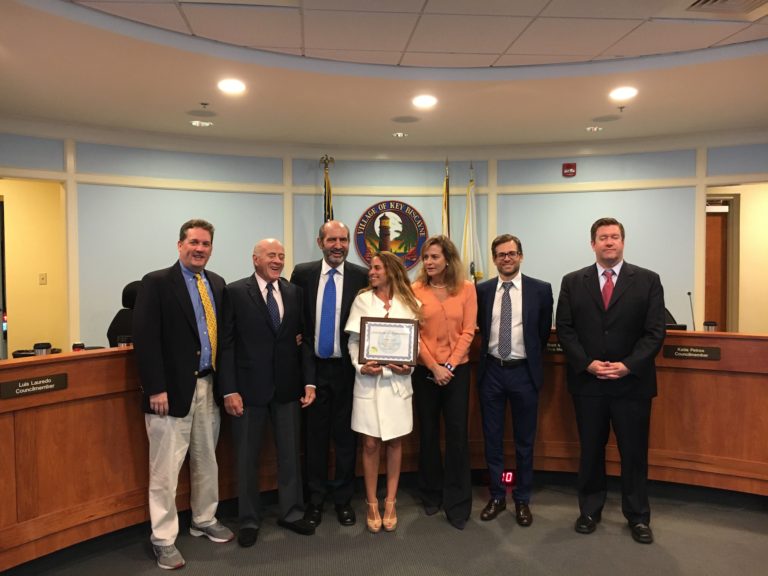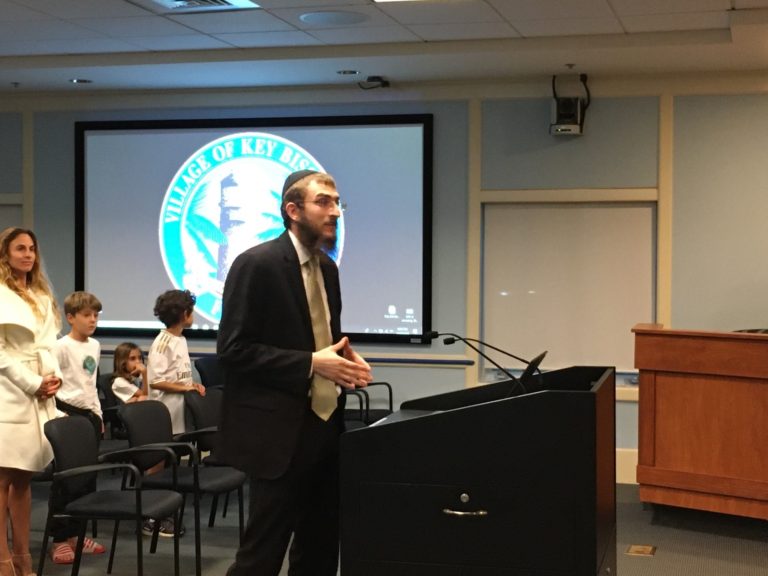Council Meeting Roundup: Water, Bonds, Ethics and More
Annali HaywardJanuary 29, 2020

Bibiana Domit, the Mexican artist who painted the mural on the Golden Hog’s east wall freehand in one day, is recognized by the Village Council in Key Biscayne, Jan. 29 (Key News/Annali Hayward)
Tuesday’s Village Council meeting featured an energized Council engaging with gusto in the first meeting of the year. The Council chambers were sparsely populated, but the agenda was full and action-packed — so much so that the clock ran out at 11 p.m. before all items were heard.
Mayor Mike Davey — invoking his 2020 to-do list — started the evening by imparting to his colleagues a renewed sense of urgency, hoping to keep up the pace of accomplishments by curtailing unproductive process.
Water, water everywhere
The meeting’s major focus related to coastal living and rising seas.
First was a presentation from the team of scientists engaged by the Village to study water quality off Key Biscayne beach. Preliminary results appear to exonerate the Central Wastewater Treatment Plant as a “significant” source of bacteria, instead pointing to the seaweed and the sand itself.
“It’s not the plant,” stated researcher Peter Sahwell, whose analysis correlated 27 years of records from the plant’s outfall (8.5km from Key Biscayne’s beach) with beach bacteria data.
The research team still has several months of data to analyze. Key News’ coverage of this important issue will be ongoing.
Next, an item raised by Council Member Allison McCormick prompted big-picture thinking relative to sea-level rise and the ever-present threat of storm surge: should the Village issue a General Obligation Bond (a kind of municipal debt) to fund big infrastructure projects?
“The types of infrastructure projects we are facing are critically important to protect our island and our assets,” said McCormick later, “but they are also expensive. Governments are realizing that with low interest rates and high bond ratings, this type of financing is the best option.”
Although some seemed surprised by the boldness of the idea, most Council members were on board with McCormick’s notion to explore putting the question to residents on the August ballot.
Voter approval would be required for the Village to issue a General Obligation Bond.
Council Member Ignacio Segurola questioned the rush, but Council Member Ed London agreed the timing could be right with interest rates likely to rise.

Rabbi Avremel Caroline, the new rabbi of the Chabad Key Biscayne Jewish Center, gives his first invocation at the beginning of a Council meeting, asking for wisdom for local leaders as they build bridges to “what could be,” Jan. 28/Key News
A legal question about stormwater systems and their maintenance proved a stickier topic. The topic arose from the recent doubling in stormwater fees and how that affects condominium owners in particular, who generally pay a fee through their management associations for their own systems as well as the Village’s. During those discussion Segurola wanted to draft a question to be considered for submission to the Florida Attorney General, to clarify whether there is a legal mechanism for the Village to help offset costs for condo owners and access their grounds for works.
Village Attorney Stephen Helfman’s version of the question was “drafted to guarantee a ‘no,’” according to Segurola, whose own, separate draft gave Vice Mayor Brett Moss cause for concern.
“It’s not totally factual,” said Moss, who worried Segurola’s language was too emotive in suggesting that condominium owners have never benefited from their stormwater utility fee.
“There is no further change to the letter,” said Helfman after much to-and-fro. “You can study it for another two years but…I don’t want to waste your time or money.”
Council voted not to send the letter with one ‘nay’ from Segurola, a former head of the condominium presidents’ council. But Davey called for a Town Hall meeting on the subject, saying later “we need to educate everyone — including ourselves — on what the issues are here.”
Finally, a vote passed (on first reading) requiring house numbers to be affixed outside waterfront properties to make it easier for marine patrol to find them during service calls. Burned by poor communication in the past on the Safe Routes to Schools project, several Council members were at pains to pin down exactly how and when the Village will talk to residents about the change.
“Wherever possible, I would have someone go door-to-door,” suggested McCormick. Village Manager Andrea Agha said that was possible and that staff would also send a certified letter to residents as well as consult the property appraiser’s records for any seemingly vacant homes.
A Town Hall for residents affected will also be held before the second reading Apr. 7.
Everything else
The much-anticipated second-reading vote on the fertilizer ordinance was deferred until Feb. 11. Council Member Katie Petros said she needed time to take into account some changes from Miami Waterkeeper.
A mild surprise was the deferral of a second-reading vote on the ethics ordinance until Feb. 11. The ordinance (if adopted) would provide reimbursement for legal fees for officials investigated, charged with or witnessing ethics violations while in office.
Village Attorney Chad Friedman said Segurola’s drafted ordinance “goes beyond the law” in providing for investigations and witnesses rather than just those charged, which current case law dictates.
That gave rise to the suggestion to “nullify” the Village’s current ordinance and let prevailing case law guide future situations.
Council Members Lauredo and London worried the ordinance would give “carte blanche” for unscrupulous individuals to rack up high legal fees, but McCormick reminded everyone the reason for the ordinance was to reassure individuals thinking of running for office that they would be covered.
Other items included:
- Approval of a contract for the demolition of the properties at Harbor Drive which the Village purchased last year for green space. The Fire Department will conduct training at the sites before demolition in March.
- Success for Fire Chief Eric Lang in his bid to buy $12,000 of cutting-edge life-saving equipment in the form of the EleGard system, which the team has been testing since October.
- Lengthy discussion of competitive bidding processes for every item or service the Village procures. In a bid to increase efficiency the Council agreed to pursue the idea of bumping up the amount of money Village Manager Andrea Agha can spend without Council approval.
- An update from Chief of Police Charles Press on homelessness on the Key. Press said the force was doing all it could for the three individuals concerned but that he would not recommend securing beds for $38,000 a year at Camillus House, as even during cold nights the individuals have refused to leave.
And finally, these are just some of the tidbits there was no time for when adjournment rolled around at 11 p.m.:
- Segurola’s “forms for funds” — i.e. process for community groups seeking grants
- Segurola’s “Key Biscayne Publicity Campaign”. Who’s ready for their close up?
- Davey on the crossing guards — presumably a follow-up to the crosswalk discussions
- Davey on last week’s Tallahassee trip — check back with Key News for further coverage.


